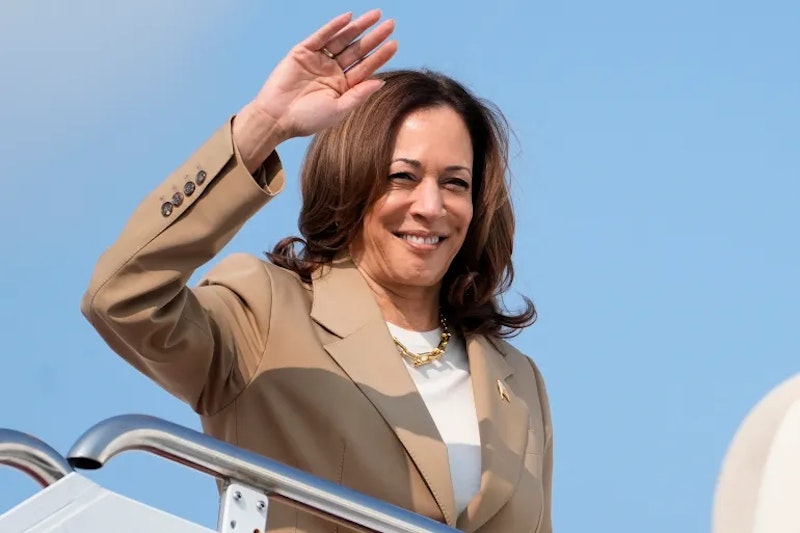The Kamala Harris presidential campaign is off to an embarrassing start, with lame memes, David Hogg declaring himself a white dude for Kamala, and the woman who works in the administration that hired Sam Brinton calling JD Vance weird. The campaign, to date, is light on policy, other than platitudes about freedom—mostly harming children through abortion and so-called gender-affirming care. Since Harris unsuccessfully pursued the Democratic nomination during the 2020 primary, however, we know what she supports—and it's campaign promises she can’t keep. Some examples include the Green New Deal, Medicare-for-All, a $15 hourly minimum wage, and widespread student loan debt forgiveness.
The $15 hourly minimum wage is an example of how liberal politicians who make pie-in-the-sky proposals operate. It's too generous to say the Biden-Harris administration gave even a half-assed effort at raising the federal minimum wage, stuck at $7.25 an hour since July 2009.
In February 2021, a proposal in the U.S. Senate to more than double the federal minimum wage from $7.25 an hour to $15 failed miserably. It got 42 votes, with several Democrats joining Republicans in opposition. The proposal needed 60 votes to pass.
Since then, the minimum wage has lost value due to inflation, effectively decreasing the wage rather than increasing it. If Harris wins the 2024 presidential election, why would anything change? The Biden administration put no effort towards brokering a more pragmatic minimum wage increase with a chance of passing in the Senate, despite many Republican Senators, including JD Vance (who took office in January 2023), supporting a higher wage. The Biden administration stopped pushing the issue, even though most people support minimum wage increases. These politicians aren't dumb. They know how the system works, but politicians exploit people who don’t. That's why Democrats run on a scare campaign against a so-called national abortion ban (federal gestational limit) despite knowing that there's nowhere near 60 votes in the U.S. Senate to make that happen.
Medicare-for-all, which Harris supports, would fail in Congress. It has strong bipartisan opposition in Washington, with most Democrats viewing a less robust public option as the best route to universal healthcare. Even Biden ripped Medicare-for-all during the 2020 primary, citing its high cost and logistical issues.
Harris can either run on this and lie to the American people, claiming it has a chance to happen, or she can flip-flop and maybe tell the truth. If Harris flips to a more moderate public option, that still may not become law.
The same is true of the Green New Deal. The proposal got 57 no votes and 43 present votes in the Republican-controlled Senate in 2019. It proposes spending trillions of dollars on environmental policy and a rapid transition from fossil fuels to renewable energies, threatening many American jobs. Climate change exists, humans contribute to it, and we should reduce carbon emissions. The Green New Deal's setback is that politicians understand that ripping their constituents' jobs away, making cars unaffordable, and substantially increasing demand for more expensive electricity would hurt their constituents.
What's the path for that becoming law? Win a several-seat majority in the U.S. Senate, kill the filibuster, and pass this insanely expensive proposal into law? Democrats will undoubtedly lose at least one U.S. Senate seat this November (West Virginia), and Cook Political Report says four other Democratic-held seats are toss-ups, while Democrats are unlikely to pick up any GOP-held Senate seats. In the best-case scenario, Democrats win the White House, take back the U.S. House with a small majority, and have 50 U.S. Senate seats. That's a tough way to govern, as is the plausible scenario where Republicans retain the House or take back the Senate, possibly both.
The $20,000 student loan debt forgiveness proposal also faces a barrier: the Supreme Court correctly ruled that the executive branch can’t unilaterally forgive student loan debt. It's also the worst proposal of the bunch. At least boosting poor people's wages, expanding health insurance access, and protecting the environment are admirable goals. Student loan debt forgiveness, conversely, is a regressive handout to Democratic constituencies that amounts to vote buying.
Maybe Harris could run on doing student loan debt bailouts via the legislative process, but, like other proposals, that may face bipartisan opposition. U.S. Rep. Seth Moulton (D-MA) criticized the Biden administration in June for prioritizing student loan debt forgiveness—and he's from a solidly blue district in Massachusetts. Imagine how swing district and swing-state Democrats may vote if the issue came up in Congress.
Who knows what Harris genuinely believes, but her Bernie-lite proposals from five years ago are still her on-the-record political positions. If that's what she wants to run on, don't buy it—because it's not happening.

